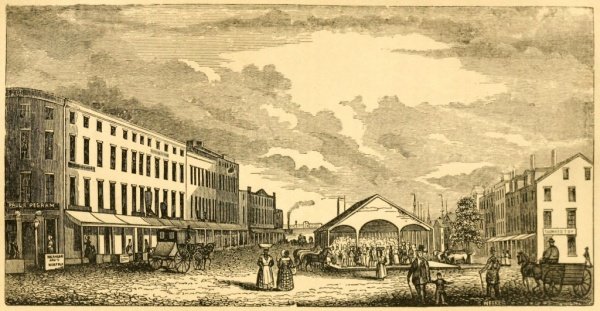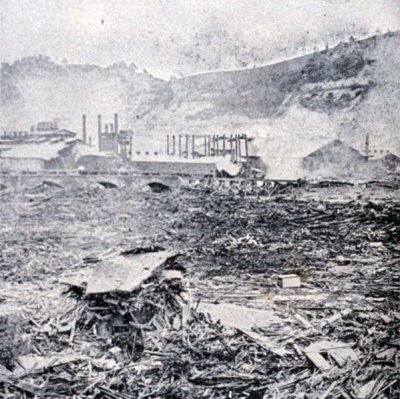Receive our blog posts in your email by filling out the form at the bottom of this page.
Thomas Jonathan “Stonewall” Jackson was born 200 years ago on this day in history, January 21, 1824, in Clarksburg, Virginia (now West Virginia). Fatherless at the age of two, and an orphan by the age of seven, Tom Jackson went on attend the U.S. Military Academy at West Point, and then served with distinction in the Mexican-American War. It was in 1849 that Jackson was baptized by an Episcopal minister. In 1851, he was appointed to the position of Professor of Natural and Experimental Philosophy, or Physics, and Instructor of Artillery at the Virginia Military Institute in Lexington, Virginia. He also joined the Lexington Presbyterian Church that same year, and would later serve the church as a deacon. He also led a Sabbath school class for African-Americans in Lexington, both free and enslaved, in defiance of a state law which opposed literacy for slaves. He married his first wife, Elinor (“Ellie”) Junkin, daughter of George Junkin, in 1853, but she died shortly after giving birth to a stillborn child the following year. He married Mary Anna Morrison, daughter of Robert Hall Morrison, in 1857. The couple had one child who survived infancy, Julia Jackson, born in 1862.
The War Between the States led Jackson into service on behalf of his beloved Commonwealth of Virginia. He had remarkable success leading his men, including the famous “Stonewall Brigade,” in battles at Manassas (where he earned the famous nickname “Stonewall”), and throughout the Shenandoah Valley, rising to the rank of Lieutenant General. On May 2, 1863, he was shot by friendly fire at Chancellorsville, leading to the amputation of his left arm, after which his commander, Robert E. Lee, sent this message: “Give General Jackson my affectionate regards, and say to him: he has lost his left arm but I my right.” After pneumonia set in, Jackson passed away on May 10, 1863, and was later buried in Lexington, Virginia. Hunter McGuire wrote of his final moments on earth:
A few moments before he died he cried out in his delirium, "Order A. P. Hill to prepare for action! Pass the infantry to the front rapidly! Tell Major Hawks," then stopped, leaving the sentence unfinished. Presently a smile of ineffable sweetness spread itself over his pale face, and he cried quietly and with an expression as if of relief, "Let us cross over the river and rest under the shade of the trees"; and then, without pain or the least struggle, his spirit passed from earth to the God who gave it.
Jackson was a tremendously self-disciplined man, and lived by the Bible, and personal maxims, such as “You may be whatever you resolve to be”; “If you desire to be more heavenly-minded, think more of the things of Heaven and less of the things of Earth”; and “Duty is ours; consequences are God’s.” He was a modest man who, in the words of D.H. Hill, “would blush like a school-girl at a compliment.”
Stories of his faith abound, including this account from his wife’s 1892 biography:
This same friend once asked him what was his understanding of the Bible command to be 'instant in prayer' and to 'pray without ceasing.' 'I can give you,' he said, 'my idea of it by illustration, if you will allow it, and will not think that I am setting myself up as a model for others. I have so fixed the habit in my own mind that I never raise a glass of water to my lips without lifting my heart to God in thanks and prayer for the water of life. Then, when we take our meals, there is the grace. Whenever I drop a letter in the post-office, I sent a petition along with it for God's blessing upon its mission and the person to whom it is sent. When I break the seal of a letter just received, I stop to ask God to prepare me for its contents, and make it a messenger of good. When I go to my class-room and await the arrangements of the cadets in their places, that is my time to intercede with God for them. And so in every act of the day I have made the practice habitual.'
'And don't you sometimes forget to do this?' asked his friend.
'I can hardly say that I do; the habit has become almost as fixed as to breathe.' — Mary Anna Jackson, Life and Letters of General Thomas J. Jackson (Stonewall Jackson) (1892), pp. 72-73
Another comes from Brigadier-General John D. Imboden (CSA) and appears in 𝐵𝑎𝑡𝑡𝑙𝑒𝑠 𝑎𝑛𝑑 𝐿𝑒𝑎𝑑𝑒𝑟𝑠 𝑜𝑓 𝑡ℎ𝑒 𝐶𝑖𝑣𝑖𝑙 𝑊𝑎𝑟, Vol. 1 (1887), p. 238:
I remarked, in Mrs. Jackson's hearing, 'General, how is it that you can keep so cool, and appear so utterly insensible to danger in such a storm of shell and bullets as rained about you when your hand was hit [at the First Battle of Bull Run/Manassas]?' He instantly became grave and reverential in his manner, and answered, in a low tone of great earnestness: 'Captain, my religious belief teaches me to feel as safe in battle as in bed. God has fixed the time for my death. I do not concern myself about 𝑡ℎ𝑎𝑡, but to be always ready, no matter when it may overtake me.' He added, after a pause, looking me full in the face: 'Captain, that is the way all men should live, and then all would be equally brave.'
Robert L. Dabney, who served as Jackson’s chief of staff during the War, wrote of his concern to uphold the Christian Sabbath, even to the extent of
His convictions of the sin committed by the Government of the United States, in the unnecessary transmission of mails, and the consequent imposition of secular labor on the Sabbath day, upon a multitude of persons, were singularly strong. His position was, that if no one would avail himself of these Sunday mails, save in cases of true and unavoidable necessity, the letters carried would be so few that the sinful custom would speedily be arrested, and the guilt and mischief prevented. Hence, he argued, that as every man is bound to do whatever is practicable and lawful for him to do, to prevent the commission of sin, he who posted or received letters on the Sabbath day, or even sent a letter which would occupy that day in travelling, was responsible for a part of the guilt. It was of no avail to reply to him, that this self-denial on the part of one Christian would not close a single post-office, nor arrest a single mail-coach in the whole country. His answer was, that unless some Christians would begin singly to practise their exact duty, and thus set the proper example, the reform would never be begun; that his responsibility was to see to it that he, at least, was not particeps criminis; and that whether others would co-operate, was their concern, not his. — Robert L. Dabney, Life and Campaigns of Lieut.-Gen. Thomas J. Jackson (Stonewall Jackson) (1866), p. 88
Jackson would be the first to acknowledge that he was a sinner, in need of the grace of Jesus Christ every hour. His list of maxims shows the kind of man he strived to be, and by all accounts from those around him, including his opponents, he was the model of a Christian gentleman, as well as a Christian soldier. We honor him two centuries after he entered this world in part because he was a heavenly-minded man who did much earthly good.
























